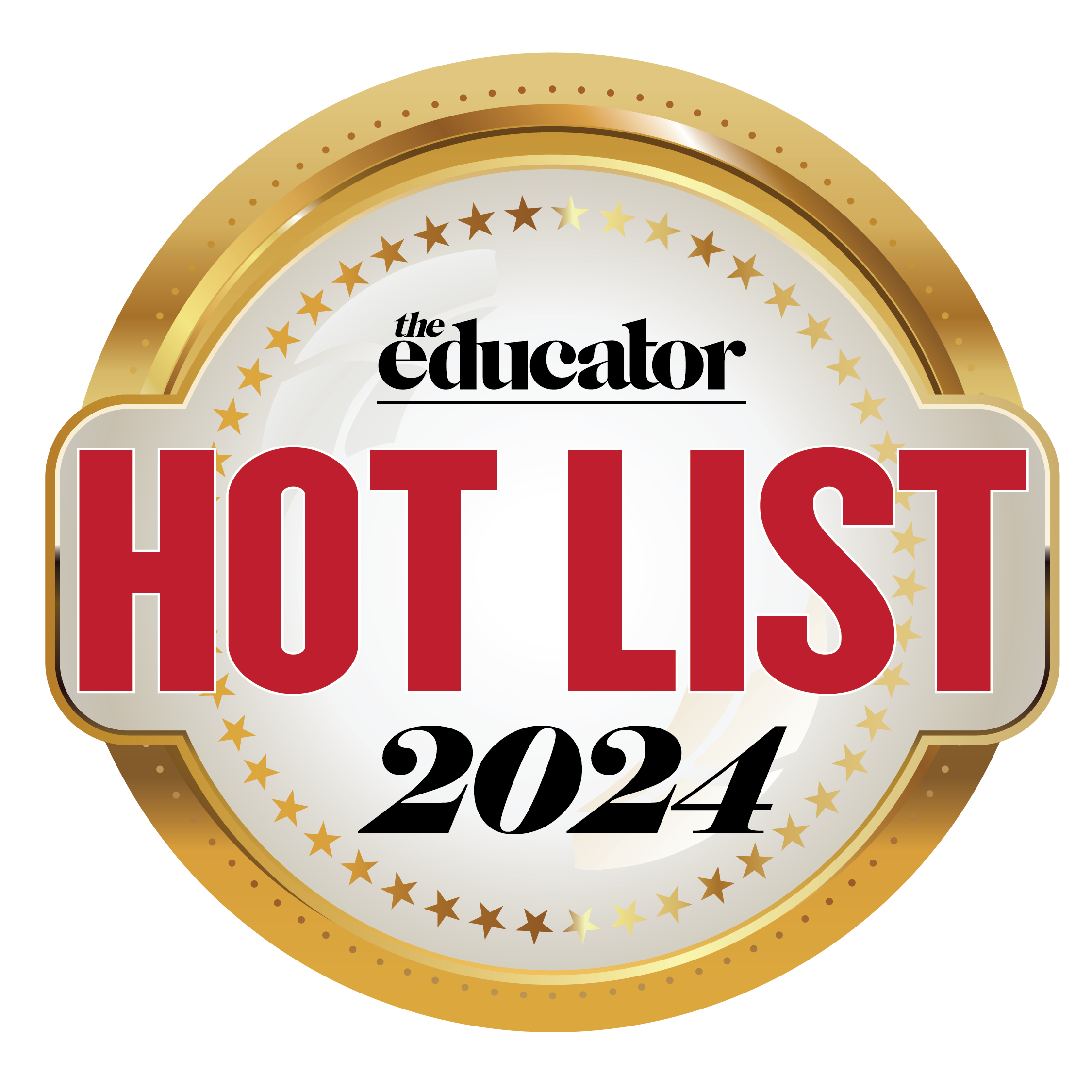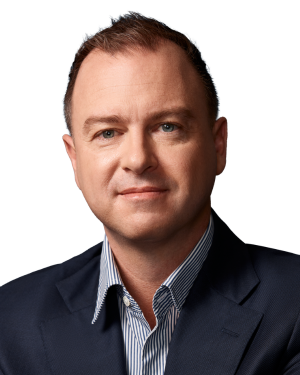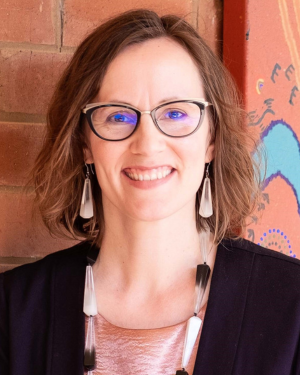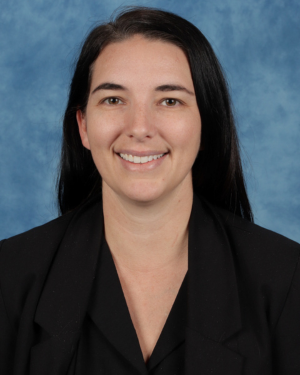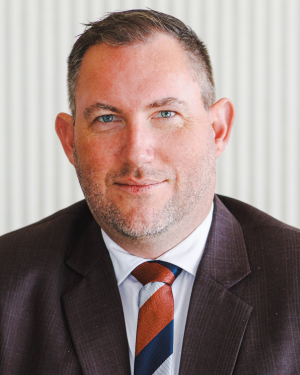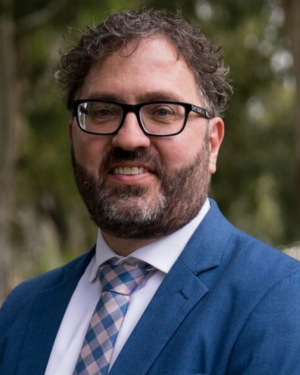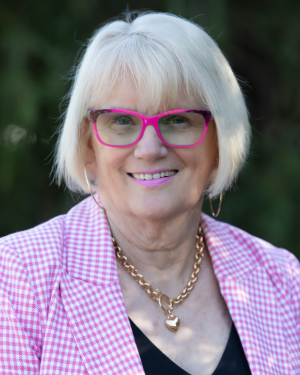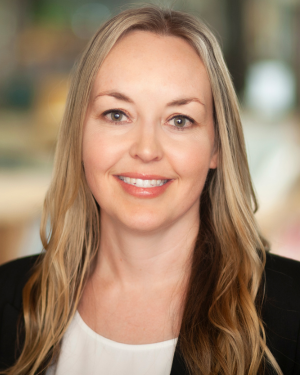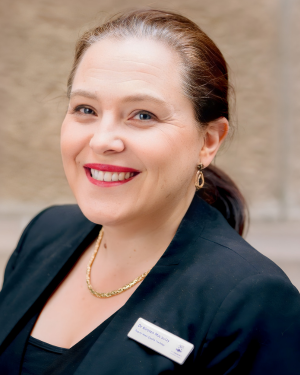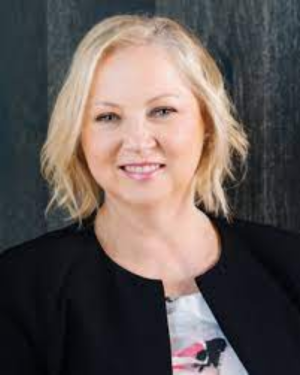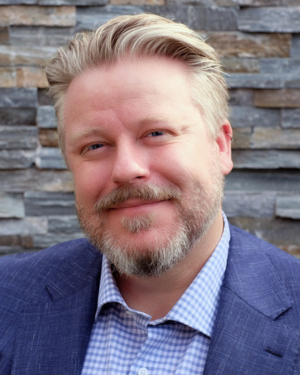- K/12
- Higher Education
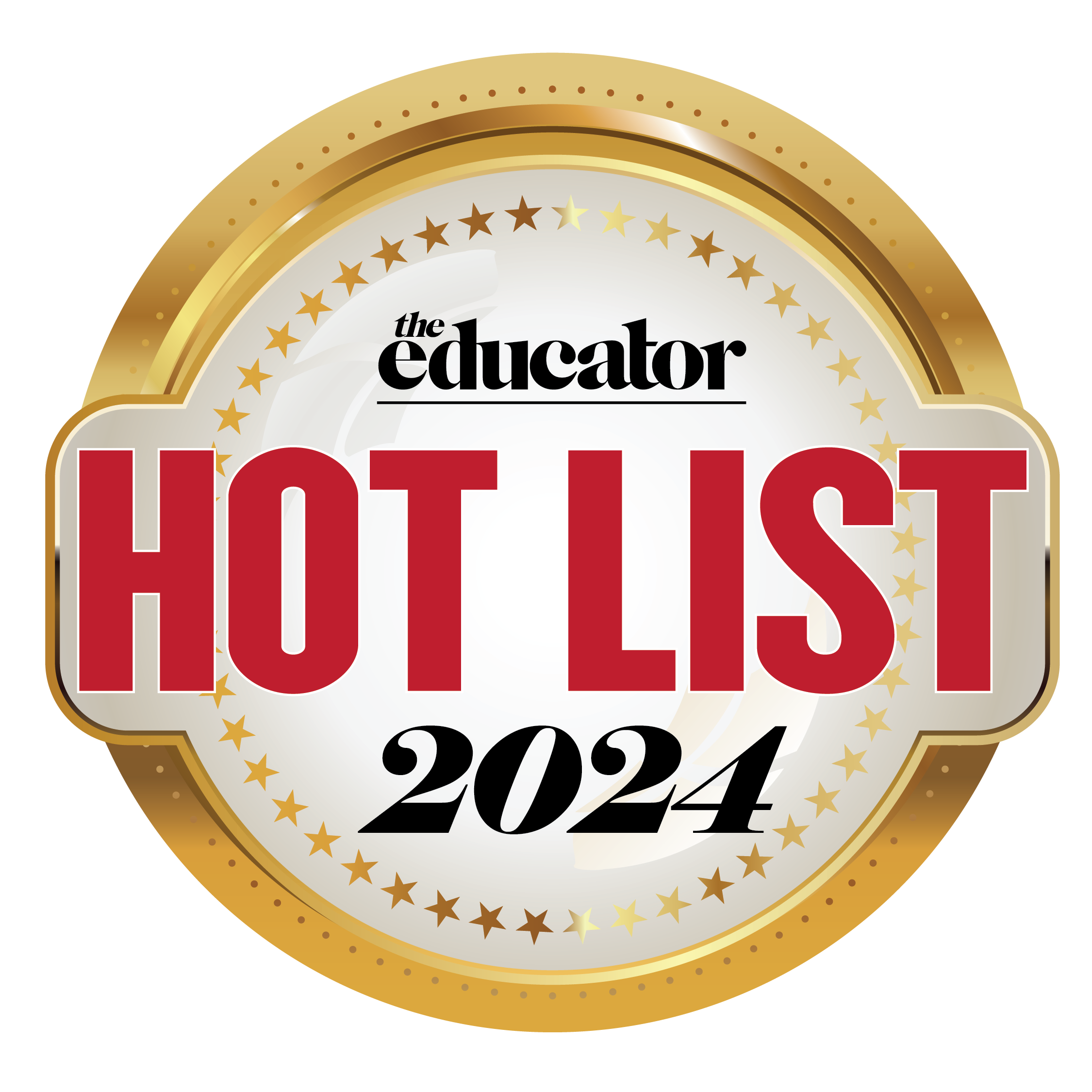
The Best Educators in Australia | The Hot List
Jump to winners | Jump to methodology
Embracing new frontiers
Education is moving forward, powered by the momentum of those with the vision, awareness and ability to innovate. Those qualities are exemplified by the select few named on The Educator’s prestigious Hot List 2024.
They are honoured for their ability to look beyond the traditional structures and implement bold strategies that fit their school’s profile, as highlighted by Justin Roberts, ReLATE national program director at the MacKillop Institute.
He says, “One of the most transformative, forward-thinking developments in education today is the shift towards whole-school approaches that prioritise wellbeing, engagement and relational trust as essential foundations for learning.”
In addition, Roberts underlines the importance of honouring “each school’s unique context, strengths and expertise.”
“This approach fosters a culture of learning that not only improves academic outcomes but also builds resilience, connectedness and a genuine love of learning,” he says.
The Educator’s data illustrates an impressive spread of ages on this year’s Hot List:
-
42% began their career before 2000.
-
12% began their career before 1990.
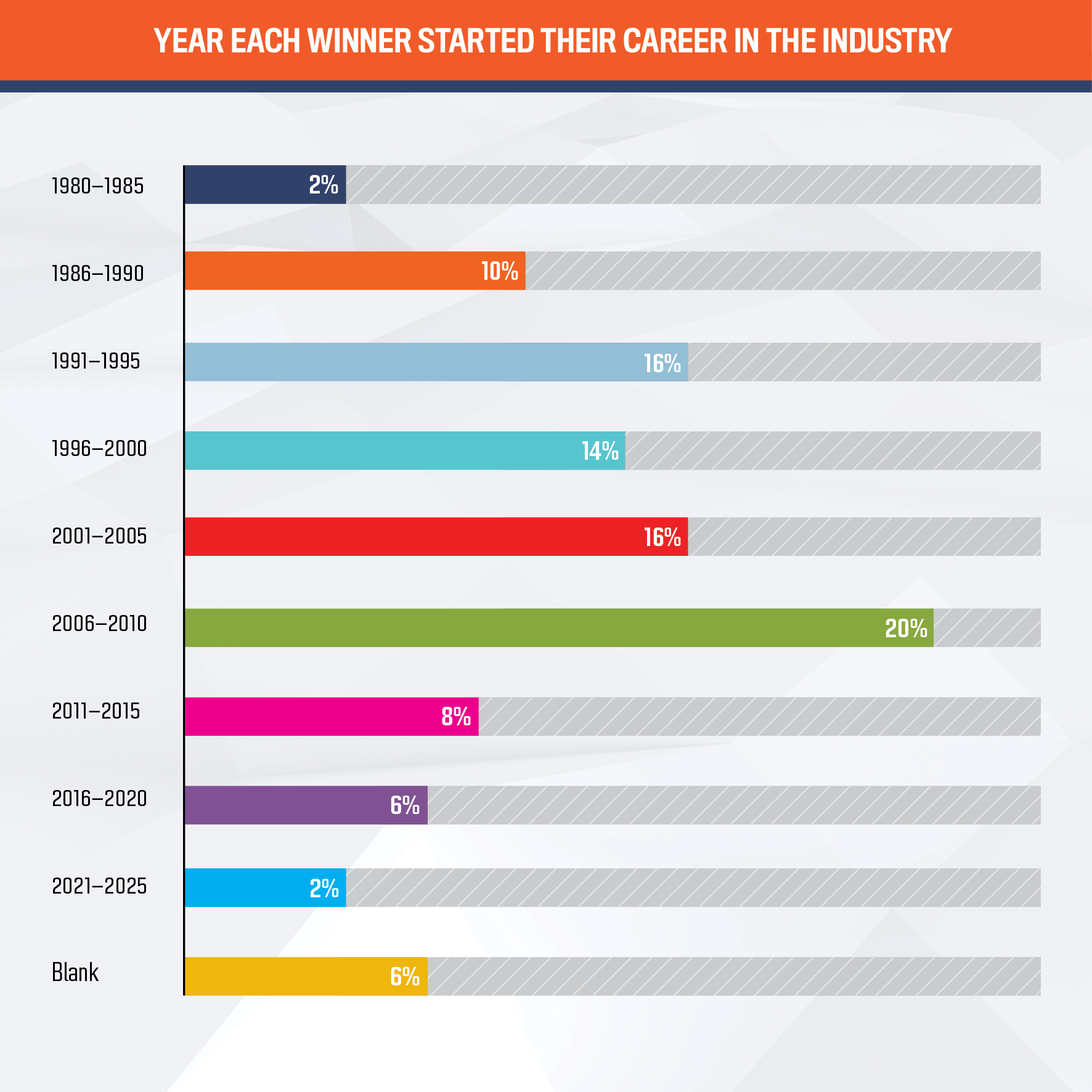
This speaks to the progressive nature and importance of transformation being embraced across generations of educators.
Those on the Hot List 2024 are even more crucial, as student enrolment nationally has risen by 3.5% between 2019 and 2023. However, the change in independent schools is a far greater 14.1%, and the majority of those featured on the Hot List are affiliated with schools in this category.
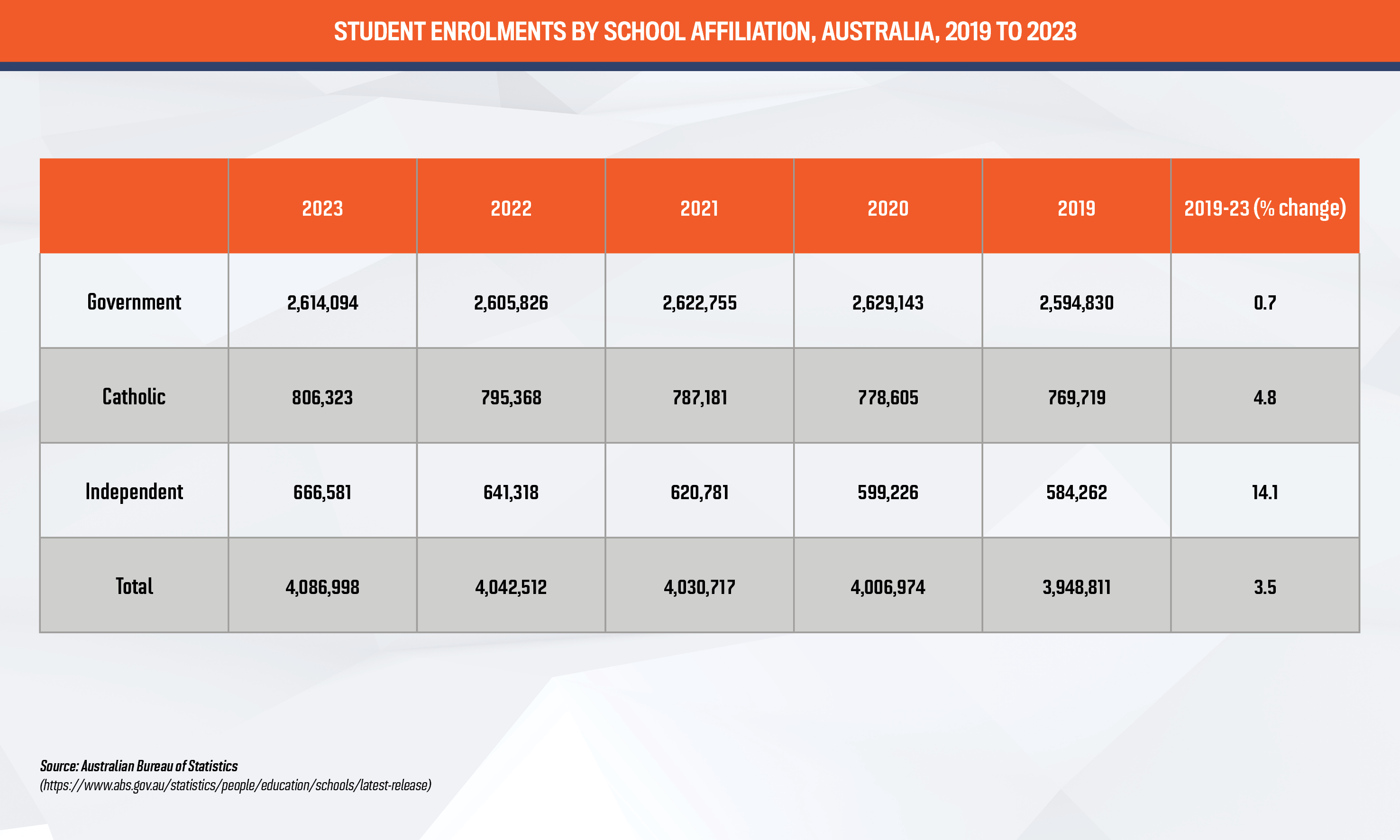

BDO’s “Navigating human resources (HR) challenges in the education sector” report pinpoints the five biggest risks, shown below.
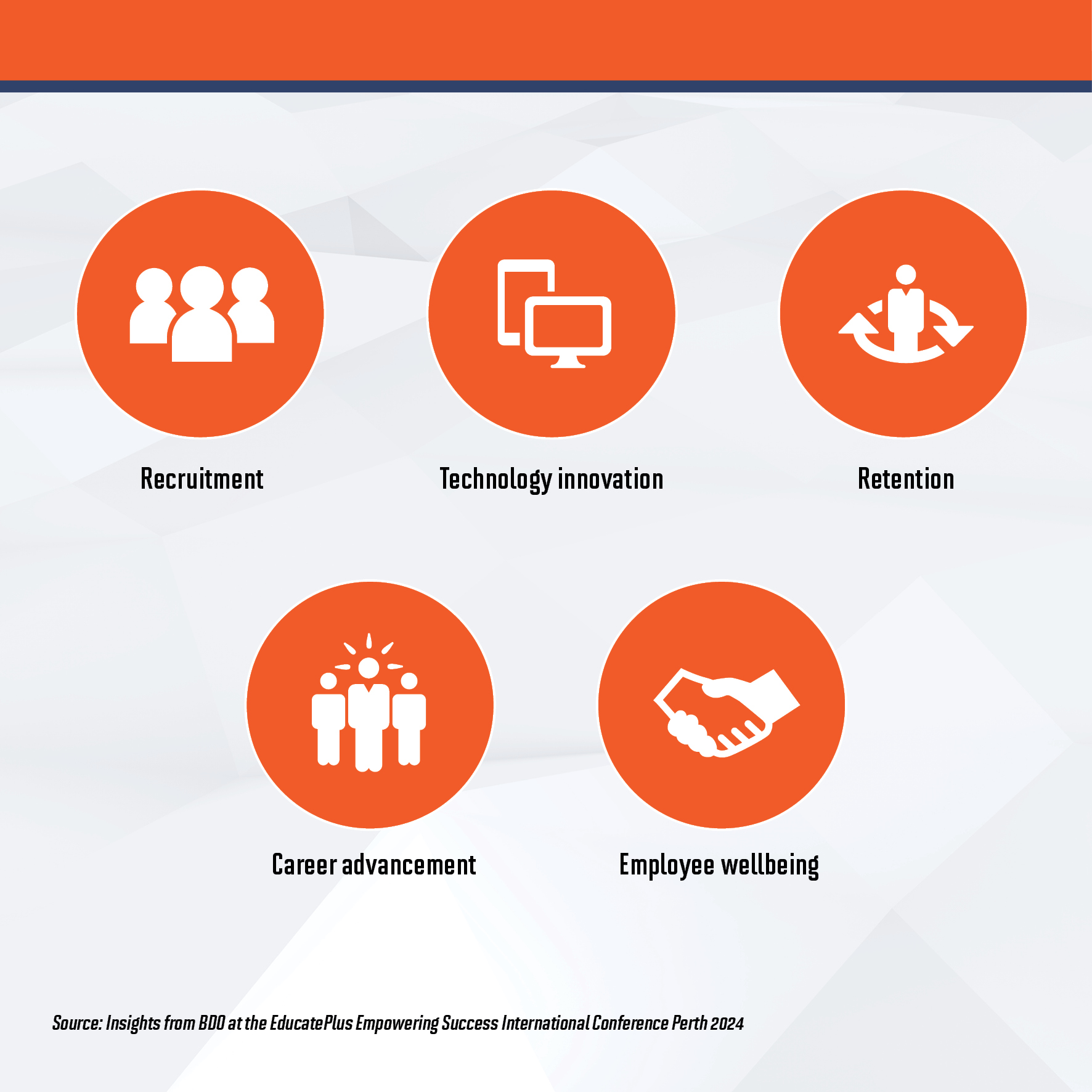
Aptly, the efforts and initiatives of those on the 2024 Hot List are tackling these challenges, directly and indirectly.
How do Australia’s Best Educators do it?
Unafraid to plot a new course is Mandi Randell, principal of Central West Leadership Academy in Dubbo. Originally from the US, she taught there and in Sydney previously.
“When I arrived here, it was clear to me that there was a massive gap in regional service and achievement for gifted children,” she says. “I decided to start a school to fill that service gap and ensure that living in Dubbo did not mean students missed out on opportunities and a high-quality gifted education program.”
The school opened back in 2018 with just 17 students but has blazed a trail over the past year; it has the highest NAPLAN averages in NSW west of the Blue Mountains across all year groups.
This is evidence that Randell’s mission to close the regional achievement gap and increase regional participation as well as completion of university is succeeding.
She says, “I have built the school from the ground up, and it is thriving academically.”
Another marker of just how well the academy is performing is that families are remaining in the area or being attracted.
“My school is an example of a regional success story where the enabling social infrastructure that my school is allows highly skilled workers like doctors and lawyers to stay in Dubbo as their children can have a high-quality educational experience that rivals that of the fanciest and most expensive city schools,” says Randell. “Our school has attracted seven doctors to Dubbo and retained numerous lawyers, engineers and businesspeople who were considering moving for better educational choices.”

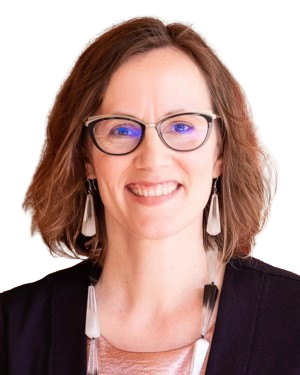
Mandi RandellCentral West Leadership Academy
Another pushing the envelope is Adrian Camm.
Westbourne Grammar School’s principal and managing director is on trend among the numerous experts calling for schools to focus on wellbeing and engagement.
During the past year, he has successfully led the shift from a focus on chaplaincy and chapel to Socratic forums for students to discuss the big issues of our times through a philosophical lens in a program titled Echoes and Dialogues. This is combined with the introduction of allied health services onsite, providing access to physiotherapy, myotherapy and chiropractic treatments.
In addition, Camm is a known advocate of tech and is at the leading edge with his AI avatar. The digital twin responds to human speech in a human-like manner, looks exactly like him and generates spoken responses with a voice clone in one of 50 languages.
“Our focus on AI, digital transformation, holistic education and wellbeing can serve as a model for schools grappling with competing priorities and complex community opinions,” he says.
And the biggest compliment is that others want to understand Camm’s strategies.
“People are wanting to learn from us, and we are only too happy to share the incredible work we are doing,” he says. “Over the past 12 months, we have hosted visits from 35 independent schools from around Australia, hosted visits from the chair of the Association of Heads of Independent Schools of Australia (AHISA), 28 delegates from the Ministry of Science and ICT in South Korea, 30 principals/deputy principals from New Zealand, a delegation of 20 school leaders from China, 40 principals from Hong Kong, 22 school leaders from Taiwan and the list goes on.”
Embracing the future and preparing his students is more important to Camm than pure exam results.
He says, “My leadership style has always been a combination of ‘out in front,’ taking risks, having courage to make the tough decisions and cultivating a safe and supportive environment for others to ‘step up and step out’ and to grow into the leaders they are destined to be. This is my real measure of progress. It’s not about ATARs, NAPLAN or anything else – it’s about providing opportunities and growing your people so they can achieve whatever it is they set out to achieve.”

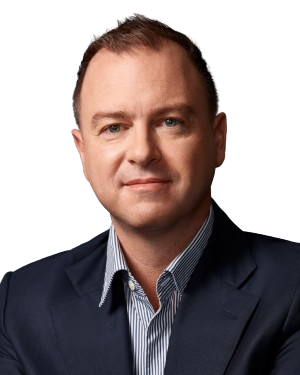
Adrian CammWestbourne Grammar School
Enhanced professional learning for teachers is offered at St Andrew’s Cathedral School in Sydney via their Professional Growth Program.
It’s the creation of deputy head, quality teaching (K–12), Kirsten Macaulay, and integrates cutting-edge pedagogical research with own-choice learning.
She says, “This allows teachers to engage in professional development that suits their schedules and interests.”
There are also recognition strategies and flexibility.
“This adaptability is crucial, as it enables us to continuously improve our professional learning offerings based on feedback and evolving needs,” Macaulay says.
An extension of this ethos is also the school’s tertiary internship, where students receive regular classroom practice, supported by expert teachers, enabling them to hone their skills whilst being remunerated.
“We offer interns priority for their final teaching placements, ensuring a seamless transition from theory to practice. Moreover, interns have access to all our professional learning sessions and resources, fostering their continuous growth,” says Macaulay.

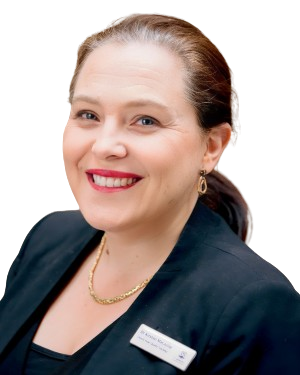
Kirsten MacaulaySt Andrew’s Cathedral School
Reaching new heights
Preparing students for life beyond the classroom is a priority for Amanda von Kanel, director of student development and teacher – senior school at Canterbury College – Waterford, located outside of Brisbane.
In a world that is becoming more divided politically, she created a student parliament for students to share opinions in a respectful and supportive environment. It has formal leadership positions in Years 6, 9 and 12 with members elected by peers in Years 5, 7, 8, 10 and 11.
“Our meetings are held at a lunch break with all students and staff invited to attend. Parliament members then stay back after lunch to continue the meeting with the members. Students who wish to raise an idea need to work on a formal proposal,” says von Kanel. “It has also built strong connections between our junior and our senior school.”
Another of the initiatives von Kanel has been a key part of implementing was the school’s Entrepreneurial Program. It equips students with the entrepreneurial skills needed to innovate and succeed in the rapidly evolving global economy, bridging the gap between education and real-world applications.
Von Kanel says, “Our students connect with businesses and mentors from the community to help them learn and launch their own business. Year 7 students have created podcasts with notable entrepreneurs and learned about the skills entrepreneurs develop running their own business.”
On top of this, von Kanel also leads Industry Professional Feedback and Networking sessions for Years 9 and 10, as well as Showcase and Market Stalls where students sell their products, promote their businesses and gain feedback.
She says, “We are seeing real momentum in the enterprise space with many students securing manufacturers to sell customised jewellery, clothing, accessories, camping/fishing and recreational products, books, educational resources and gift boxes. Other students have created their own products, including an app to assist neurodivergent families and gardening planter boxes.”

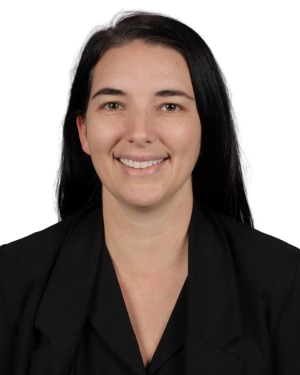
Amanda von KanelCanterbury College – Waterford
Following in a similar track is Stuartholme School’s dean of boarding, Jane Morris. Based in Brisbane, the school caters for girls both day and boarders.
Morris has innovated to ensure students are future-focused by transforming the boarding program away from the traditional “home away from home” environment.
The design has been to create critical and creative thinkers, with a mix of learning areas:
-
Collaborative spaces: Tutors can facilitate small group sessions, encouraging interaction, shared problem-solving and peer learning.
-
Silent study spaces: Students who require a quiet environment can focus without distractions, enhancing their productivity and academic outcomes.
Morris says, “The motivation behind these changes was simple yet profound: to create an environment where every boarder feels empowered to achieve their personal best, academically and beyond.”
In addition, Morris also introduced an enhanced tutoring program, where specialists are brought in for three hours on weekday evenings, providing targeted assistance across various subjects.
“By understanding individual learning styles and creating strategies tailored to each student, we enable boarders to approach their studies in ways that maximise their potential,” she says. “This personalised support is further strengthened through our close connection with the day school, where staff work in unison to nurture a culture of academic excellence.”
The academic impact is evident in 2023 results:
-
100% of boarders successfully attained their QCE, a first for Stuartholme’s boarding house.
-
100% of boarders received university offers, with many gaining entry into rural health or agriculture programs relevant to their home communities.
-
5% of boarders were among the 35% of students achieving an ATAR of 90 and above, reflecting the success of Morris’ academic program


Jane MorrisStuartholme School
Community connections
Janine Stratford, founder, leadership coach, coach-trainer and career strategist at Coaching Focus, says, “To sustain a culture of innovation, it is vital to capture the passion in our educators for this worthy and vital profession. We need to reconnect them to the reason why they joined this profession.
“To do this, we need to work smarter, not harder. We need to collaborate, streamline systems and remove the unnecessary, with more educators working together in a more coordinated and strategic approach.”
Cultural understanding and social justice are emerging themes crucial for students and staff.
Paola Tamberlin, director of culture and community at Queenwood School, designed a program to bridge cultural and religious divides by providing students with meaningful interactions.
Part of this was an exchange with Unity Grammar (an Islamic school in Western Sydney) involving students engaging in a series of activities both educational and personal, such as shared meals where students discuss their respective faiths, cultures and rituals, fostering an environment of mutual respect and curiosity.
This helped students move beyond stereotypes and develop a more nuanced understanding of the diversity within Australian society.
Tamberlin, a member of the Australian Education Research Organisation’s First Nations Expert Reference Group, identified that while Queenwood students are privileged in terms of resources, they are often disadvantaged in their ability to access multiple worldviews. This can lead to a limited understanding of the world and her focus to ensure the students see beyond their own experiences and develop a more inclusive and empathetic perspective.
To further these efforts, Tamberlin also developed workshops on media literacy, critical thinking and effective advocacy to teach students how to navigate complex social issues, find reliable information in a world of polarised news and communicate their messages effectively to those in power.
An important aspect of Tamberlin’s work is that empathy, inclusivity and social justice are not just taught in isolated lessons but woven into the fabric of school life.
Building bridges is also the calling card of Strathcona Girls Grammar’s dean of teaching and learning, Kara Baxter.
As an executive member of the Victorian branch of the Australian Council for Educational Leaders (ACEL), she has been instrumental in guiding the organisation’s strategic direction. Her contributions have centred on enhancing leadership, particularly through her involvement in organising the inaugural Leaders Connect event. The initiative brought together leaders from Catholic, independent and government schools to collaborate and share expertise and create a platform to discuss common challenges, explore innovative solutions and build professional networks.
Baxter built a similar model at Strathcona Girls Grammar by organising the school’s teachers into collaborative Professional Learning Teams (PLT) to undertake research on cultures, fostering an environment of continuous improvement where educators share best practices, engage in reflective dialogue and create shared practice across the school.
She was also the driving force behind The Strathcona Innovation Institute.
“My motivation stemmed from observing the rapid evolution of industries and the growing importance of digital fluency,” Baxter says. “For our students, it’s about equipping them with the skills to thrive in STEAM (Science, Technology, Engineering, Arts and Mathematics) fields, fostering creativity, critical thinking and collaboration.”

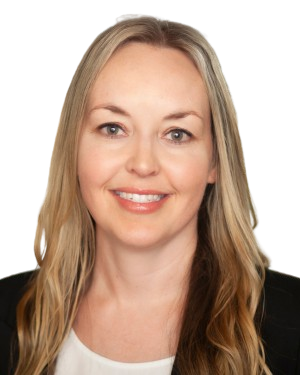
Kara BaxterStrathcona Girls Grammar
The institute also hosted a multi-day event featuring coding and drone workshops for girls in Years 5–8, alongside a panel of accomplished women in technology, mathematics and science who shared their career journeys.
Baxter says, “Research shows girls are often underrepresented in STEAM fields due to societal biases and limited exposure to female role models. Events like these create a supportive environment where girls can experiment and lead. The response from our students and staff has been overwhelmingly positive.”
The institute also offers additional opportunities for students outside of the classroom, such as eSports clubs, coding clubs and steam and robotics clubs, where students’ skills in strategy, teamwork and digital literacy intersect.
Baxter says, “What began as a pilot project has evolved into many students being involved in interschool competitions, where students build communication and problem-solving skills in an environment many already find engaging.”
Another initiative that she has implemented is a new professional learning model, Unstoppable Xperts, that emphasises individual goal setting, peer feedback, leadership mentoring and a focus on digital and innovation. It encourages teachers to set personal professional goals aligned with the school’s strategic priorities, seek constructive feedback from peers and participate in leadership development activities.
The Best Educators in Australia | The Hot List
- Alexandra Mangraviti
Assistant Principal
St Paul of the Cross Catholic Primary School Dulwich Hill (NSW) - Anam Javed
Manager – Learning
Victorian Academy of Teaching and Leadership (Vic) - Anne Johnstone
Principal
Ravenswood School for Girls (NSW) - Anne McLauchlan
Principal
The Gap State High School (Qld) - Candace Neville
Innovation and Technology Coordinator (Primary)
John Paul College (Qld) - Chris Nastrom-Smith
Deputy Principal – Curriculum
Loreto College Coorparoo (Qld) - Chrissy Gamble
School Principal
Kingswood College Melbourne (Vic) - Christopher Dunn
Dean of Studies
St Margaret’s Anglican Girls School (Qld) - Corey Tavella
Principal
Thomas More College, Salisbury Downs (SA) - Darren Ponman
School Principal
Hunter School of The Performing Arts (NSW) - Doug Thomas
Principal
Claremont College (NSW) - Georgina Koskinas
Deputy Principal
Ingleburn High School (NSW) - Helen Finlay
Principal
St Peter’s Woodlands Grammar School (SA) - Jacqui Zervos
Executive Director, Educational Innovation
Brisbane Grammar School (Qld) - James Kennedy
Director and Pre-VCE Chemistry Teacher
Kennedy College (Vic) - Jane Morris
Dean of Boarding
Stuartholme School (Qld) - Jay Chew
Select Entry Enrichment Program Coordinator
Al-Taqwa College (Vic) - Justin Pembroke
Head of Digital Innovation
Sunshine Coast Grammar School (Qld) - Kerry Brown
Founding Director
Edtasker (Qld) - Kim Flintoff
Program Facilitator/Special Projects
IDEA (WA) - Kristen Smith
Assistant Principal – Primary (Kalkallo Campus)
Hume Anglican Grammar (Vic) - Lauren Sayer
Director of Curriculum
Victorian Curriculum and Assessment Authority (Vic) - Matt Pitman
Head of Secondary (Senior Program Lead)
Global Village Learning (Vic) - Michael Brook
Dean of College Administration
Seton Catholic College (WA) - Michelle Terret
Head of Year 10
Indooroopilly State High School (Qld) - Mitchell Mills
Head of Year 11/12
Saint Stephen’s College (Qld) - Monique Riviere-Pendle
Head of Religious Education and Ethics
Casey Grammar School (Vic) - Naomi Williams
Head of Secondary
Moreton Bay Boys’ College (Qld) - Paola Tamberlin
Director of Culture and Community
Queenwood School (NSW) - Peter Foster
Principal
Mancel College (Qld) - Rebecca Bettiol
Learning Leader MYP –Arts and Design
Oakleigh Grammar (Vic) - Ross Jardine
School Principal
Toogoolawah State High School (Qld) - Sabine Partington
Deputy Principal
Redlands (NSW) - Sabrina (Xiaoxiao) Li
International Students Coordinator/Language Teacher
St Margaret’s Berwick Grammar (Vic) - Shannon Warren
Principal
Woodcroft College (SA) - Shelley Waldon
Science and STEM Lead
Melbourne Archdiocese Catholic Schools (Vic) - Steven Middleton
Associate Principal
St Margaret’s Berwick Grammar (Vic) - Thomas Oliphant
Head of Technology and Enterprise
St Johns Grammar School (SA) - Tijtje Keatley
Director of Music/Learning Specialist
Mount Waverley Secondary College (Vic) - Trish Trchala
Head of Learning Resources
Xavier College (Vic) - Vanessa Browning
Principal
Seymour College (SA) - Vince Wall
AI for Teaching and Learner Project Leader and History Teacher
All Hallows’ School (Qld)
Insights
Methodology
The Educator received nominations for the 10th annual Hot List between 29 July and 23 August. The team obtained details of the nominees’ achievements and contributions to the profession. Nominees were evaluated based on the overall impact of their work in the K–12 education sector over the past 12 months, demonstrating expertise in linking theory and practice and designing and implementing innovations that provide students with high-quality educational experiences.
Although narrowing down the list of candidates was challenging, the selection process was worthwhile, thanks to the achievements of the 50 winners who represent the cutting edge of educational excellence in Australia.



